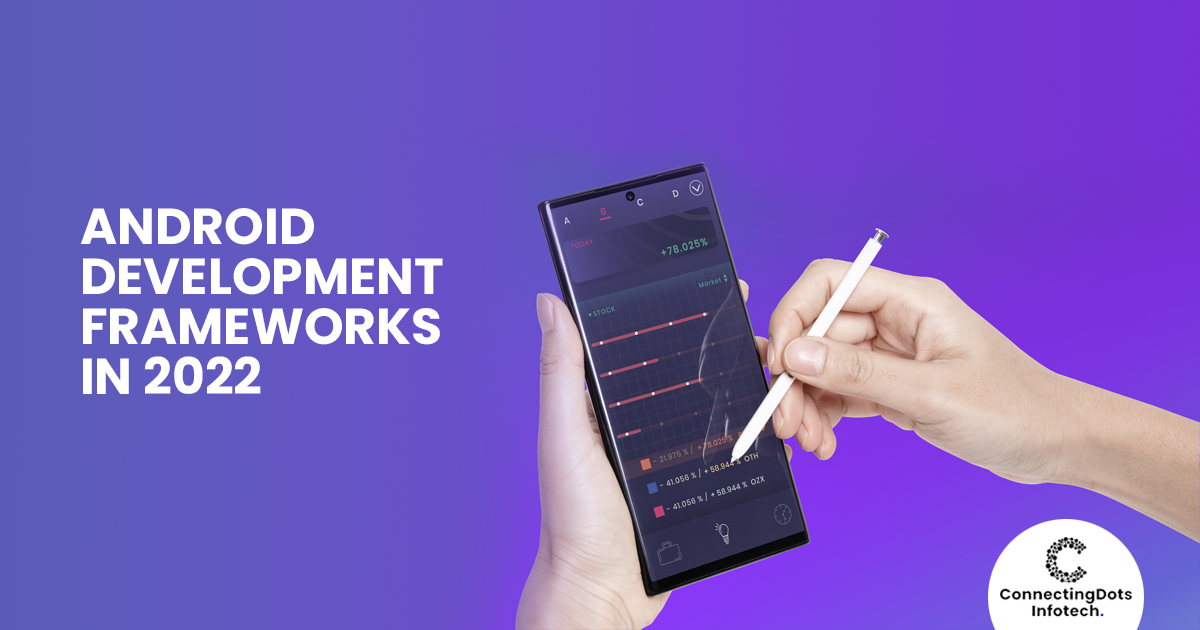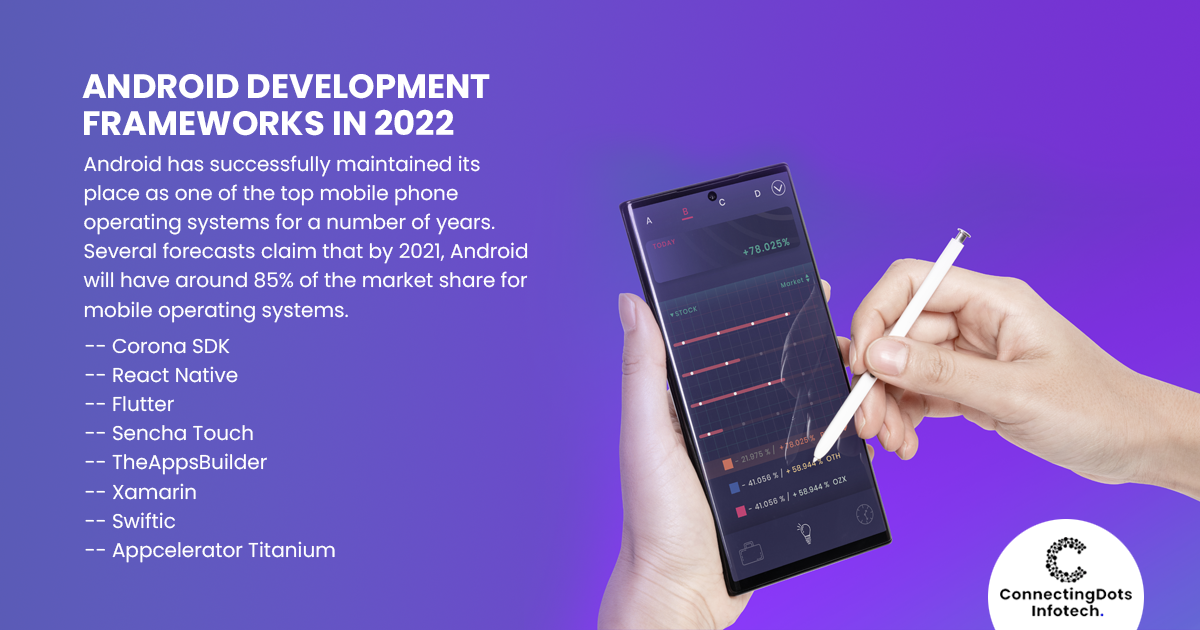Android Development Frameworks In 2022-23

Android has successfully maintained its place as one of the top mobile phone operating systems for a number of years. Several forecasts claim that by 2021, Android will have around 85% of the market share for mobile operating systems. Due to the fact that there are more than 2 billion active smartphone users worldwide, the Android app market is a very profitable and booming industry for companies and entrepreneurs.
If your company already has an Android application or is aiming to launch one soon, you need to be completely knowledgeable about Android app development frameworks. In this post, we'll talk about the top 10 frameworks for building Android apps in 2022.
Corona SDK
Corona SDK has a relatively straightforward syntax. It is regarded as one of the best 2D mobile application development frameworks available today for both Android and iOS. When it comes to creating game apps for smartphones, Corona SDK is very well-liked. The most well-known games developed with Corona SDK are Warcraft, Hopiko, and Angry Birds. With just one piece of code, this framework makes developing apps ten times faster. At its backend, it employs Lua, a highly straightforward, reliable, and lightweight programming language.
React Native
This cross-platform application development framework was introduced in 2015 and is supported by the former Facebook-owned social media juggernaut Meta. One of the greatest frameworks for creating Android apps is currently on the market. To mention a few, the most excellent React Native apps include Amazon Prime, Skype, and Airbnb. It is dependent on React, a sizable and comprehensive JavaScript package that expedites and reduces the cost of developing apps. It can reuse parts throughout the cycle of app development and contains built-in UI components.
Flutter
Google has provided you with an open-source, free-to-use framework for developing Android apps that can produce native software for both the iOS and Android operating systems. It is a fantastic SDK framework for cross-platform application development that has an unmatched smartphone UI framework that enables developers to quickly construct appealing mobile applications. It also includes a really creative method for building mobile applications. It is a fairly compact framework with functionality for integrating external third-party APIs, debugging tools, and a rendering engine. Leaders like Google and Abbey Road Studios use it.
Sencha Touch
The creation of native Android apps is the main emphasis of this framework. By the community of developers, it is frequently regarded as one of the best frameworks for developing specialised Android applications. Sencha Touch uses HTML and Javascript to create dynamic, visually appealing Android apps that run better. Hardware acceleration techniques are also used. To the satisfaction of those who create mobile applications, it offers more than 50 native UI elements and styles. It is popular among developers because of features like rich animations, high compatibility, sensitive touch, and smooth scrolling.
TheAppsBuilder
TheAppsBuilder is a brand-new and distinctive framework for creating Android applications that run on HTML and supports no-code user interface design. As a result, to use this framework to construct an Android application, you do not need any programming experience. This is very appropriate for developing Android applications with plenty of information. The drag-and-drop functionality of the framework makes it very simple to put together the various app components during the course of the mobile application development cycle. Additionally, TheAppsBuilder has built-in blocks that provide a variety of capabilities and are supported by a simple graphical user interface.
Xamarin
Developers utilise the.NET framework along with this rather older open-source, cross-platform framework, which is controlled by Microsoft. Numerous major players have been drawn to Xamarin as a result of its merging with Visual Studio IDE. It makes use of the C# programming language, which enables the development of apps with little to no coding. A middle layer of the framework in Xamarin regulates the communication between the standard code and the core system code.
Swiftic
Anyone may construct a mobile application using our DIY Android app development platform, even those with practically no coding experience. It not only enables users to access online resources rather than beginning from scratch, but it also features a very user-friendly layout with clear navigation and guided interactions. Swiftic also permits a number of sophisticated third-party integrations and provides a 30-day money-back guarantee if the consumer is not happy with the product.
Appcelerator Titanium
An open-source framework for app creation, this SDK-based solution enables programmers to produce native Android apps from a single JavaScript source file. It is one of the best frameworks for developing Android apps in 2022 for this reason. With JavaScript, extremely strong and dynamic android apps may be created. By only distributing around 60% to 90% of the current code base, it also enables the creation of Android apps across other platforms.
Ionic
With the help of HTML5, JavaScript, and CSS3, this cross-platform android application development framework can produce feature-rich mobile applications for businesses of all sizes. This framework allows the creation of apps for mobile and the internet with a single source of code thanks to a variety of resources, including tools, animations, and gestures. Ionic gives developers access to live refresh, emulators, logging, and other critical capabilities that facilitate the easy, seamless, and error-free creation of Android apps.
PhoneGap
PhoneGap is a popular cross-platform android application development framework that is used to generate native apps for Android, iOS, and Windows Mobile devices. Because of the abundance of Javascript, HTML5, and CSS3, it is becoming more and more developer friendly. Because it enables them to debug or inspect the code and make modifications to the application in real-time, even before compilation, developers typically favour the PhoneGap platform. This framework's most recent iteration also includes the Cordova WebView.

Conclusion
Developers find it challenging to simultaneously match market needs and align the business's goal as interconnection and rivalry among modern enterprises continue to increase. This calls for a varied team of professionals with years of expertise, exposure to the business, and a thorough understanding of both the domains of the sector and the procedure for developing an Android app.
Some of the key platforms that are well-liked by the developer community in the android app development sector are React Native, Corona SDK, Ionic, Flutter, and PhoneGap.
